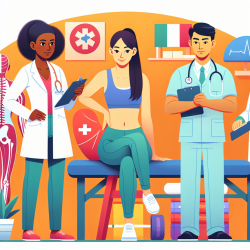Introduction
In the realm of rehabilitation, the provision of appropriate wheelchairs is crucial for enhancing the quality of life for individuals with mobility impairments. A recent scoping review titled "Wheelchair service provision education for healthcare professional students, healthcare personnel and educators across low- to high-resourced settings" provides valuable insights into the current state of wheelchair service education and its integration into professional programs.
Key Findings from the Scoping Review
The review highlights several critical areas:
- Limited integration of wheelchair service content into rehabilitation curricula.
- Varied training methods, including in-person, online, and hybrid approaches.
- The necessity for international collaboration to standardize training programs.
Implementing Educational Outcomes
For practitioners seeking to enhance their skills, the following strategies are recommended based on the review's findings:
- Adopt Hybrid Learning Models: Utilizing both online and in-person training can overcome geographical and resource limitations, making education more accessible.
- Integrate WHO Guidelines: Incorporating the World Health Organization's wheelchair service training packages can ensure a standardized approach to education.
- Collaborate Internationally: Building partnerships across borders can enhance the quality and reach of educational programs.
Encouraging Further Research
The review underscores the need for further research in several areas:
- Exploring the effectiveness of different educational models in various settings.
- Assessing the impact of integrated curricula on practitioner competency and patient outcomes.
- Developing resources that facilitate the integration of wheelchair service content into existing programs.
Conclusion
Enhancing wheelchair service provision education is pivotal for creating a competent workforce capable of delivering high-quality care. By leveraging the insights from this scoping review, practitioners and educators can make informed decisions to improve training programs, ultimately leading to better outcomes for individuals with mobility impairments.
To read the original research paper, please follow this link: Wheelchair service provision education for healthcare professional students, healthcare personnel and educators across low- to high-resourced settings: a scoping review.










